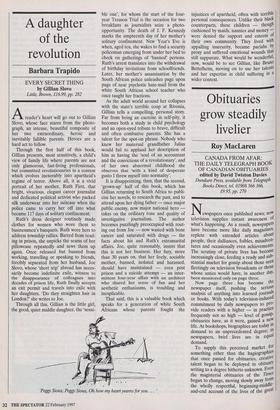A daughter of the revolution
Barbara Trapido
EVERY SECRET THING by Gillian Slovo Little, Brown, £16.99, pp. 282 Areader's heart will go out to Gillian Slovo, whose face stares from the photo- graph, an intense, beautiful composite of her two extraordinary, heroic and inevitably fallible parents. Heroes are a hard act to follow.
Through the first half of this book, Gillian presents, most sensitively, a child's view of family life where parents are not only glamorous, fast-living professionals, but committed revolutionaries in a context which evolves inexorably into apartheid's regime of terror. Above all, it is a vivid portrait of her mother, Ruth First, that bright, vivacious, elegant career journalist and dedicated political activist who packed silk underwear into her suitcase when the police came to carry her off into what became 117 days of solitary confinement.
Ruth's dress designer routinely made clothes for women who wore them to businessmen's banquets. Ruth wore hers to address township rallies. Barred from read- ing in prison, she unpicks the scams of her pillowcase repeatedly and sews them up again. Once released but banned from working, travelling or speaking to friends, forcibly separated from her husband, Joe Slovo, whose 'short trip' abroad has neces- sarily become indefinite exile, witness to the disappearance of colleagues into decades of prison life, Ruth finally accepts an exit permit and travels into exile with her daughters. 'Do they straighten hair in London?' she writes to Joe.
Through all this, Gillian is the little girl, the good, quiet middle daughter, the 'sensi- ble one', for whom the start of the four- year Treason Trial is the occasion for two breakfasts as journalists seize a photo- opportunity. The death of J. F. Kennedy marks the umpteenth day of her mother's solitary confinement. New Year's Eve is when, aged ten, she wakes to find a security policeman emerging from under her bed to check on gatherings of 'banned' persons. Ruth's arrest translates into the withdrawal of birthday invitations from schoolfriends. Later, her mother's assassination by the South African police unleashes page upon page of near psychotic hate-mail from the white South African school teacher who once taught her fractions.
As the adult world around her collapses with the state's terrible coup at Rivonia, Gillian tells a compelling, personal story. Far from being an exercise in self-pity, it becomes both a study in child psychology and an open-eyed tribute to brave, difficult and often combative parents. She has a talent for the spot-on phrase. Nobody who knew her maternal grandfather Julius would fail to applaud her description of him as having the 'soul of an accountant and the convictions of a revolutionary', and of her own abnormal childhood she observes that 'with a kind of desperate gusto I threw myself into normality'.
It is disappointing, then, that the second, `grown-up' half of this book, which has Gillian returning to South Africa to publi- cise her novels, to research the past, and to attend upon her dying father — once major public enemy, now major national hero takes on the ordinary tone and quality of investigative journalism. The author becomes puzzlingly preoccupied with rout- ing out from Joe — now wasted with bone cancer and saturated with drugs — the facts about his and Ruth's extramarital affairs. Joe, quite reasonably, insists that this is not her business. Her fury, more than 30 years on, that her lively, sociable mother, banned, isolated and harassed, should have maintained — even post prison and a suicide attempt — an inter- mittent four-year affair with an architect who shared her sense of fun and her aesthetic enthusiasms, is troubling and inexplicable.
That said, this is a valuable book which speaks for a generation of white South Africans whose parents fought the • . `Peggy Sioux, Peggy Sioux, Oh how my heart yearns for you . . . ' injustices of apartheid, often with terrible personal consequences. Unlike their black counterparts, these children — though cushioned by maids, nannies and money — were denied the support and esteem of their own community. They lived with appalling insecurity, became pariahs by proxy and suffered emotional wounds that still suppurate. What would be wonderful, now, would be to see Gillian, like Bruno Bettelheim, moving on to use her talents and her expertise in child suffering in a wider context.


























































 Previous page
Previous page